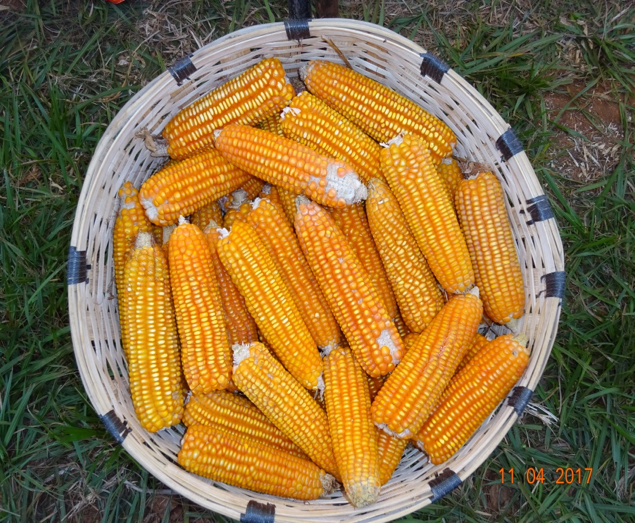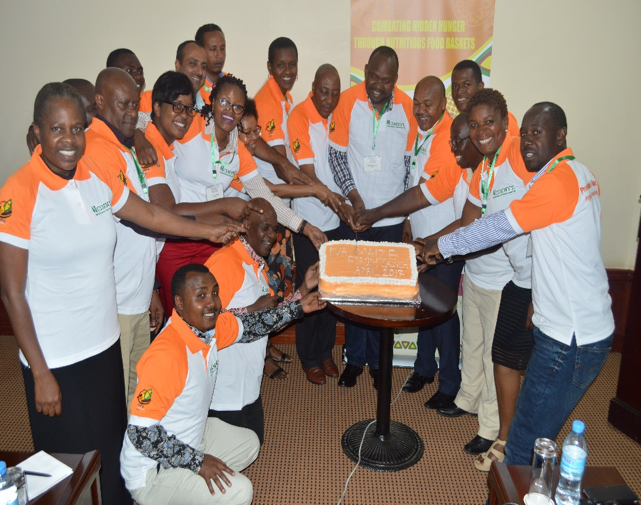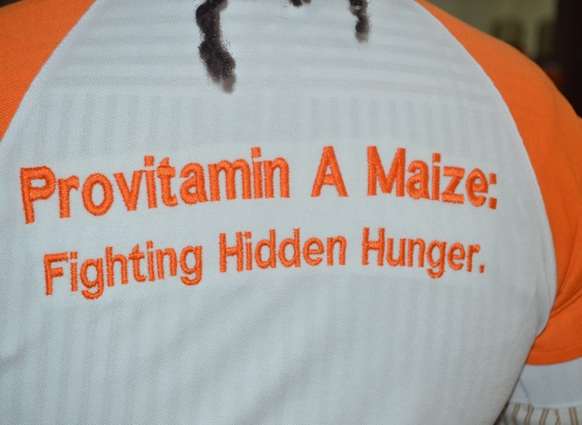In Tanzania, Vitamin A deficiency (VAD) is considered a major public health problem requiring appropriate nutrition interventions. The overall magnitude of VAD in Tanzania is 33 percent (Global Nutrition Report; 2014), affecting mostly children in preschool and women of reproductive age. VAD causes morbidity, nutritional blindness, and even death. Even mild levels of VAD may damage health leading to low school performance in children and poor productivity for adults.
Provitamin A Maize (PVA) maize is a special type of maize that is biofortified and contains high levels of beta-carotene.

Beta-Carotene is an organic, strongly colored red-orange pigment abundant in plants and fruits. Beta-carotene is what gives PVA maize an orange color and is converted to Vitamin A in the body after consumption to provide additional nutritional benefits. As a staple food, maize is produced and consumed by most people in Tanzania, and can therefore be a cheap and sustainable source of Vitamin A especially for the vulnerable rural poor populations. To address micronutrient malnutrition (hidden hunger); biofortification works to increase nutritional value of staple food crops by increasing the density of vitamins and minerals in a crop through either conventional plant breeding; agronomic practices or biotechnology. Examples of these vitamins and minerals that can be increased through biofortification include provitamin A Carotenoids, zinc and iron.
The PVA maize was recently introduced to Tanzania through collaborative efforts of multiple institutions including the Government of Tanzania, Tanzania Official Seed Certification Institute (TOSCI); Seed companies (Meru Agro-Tours & Consultants Co. Ltd (MATC) and Tanseed International ltd) and International Maize and Wheat Improvement Center (CIMMYT), working as a partnership under the Building Nutritious Food Baskets Project (BNFB). Two Provitamin A maize varieties – Meru VAH517 and Meru VAH519 –were released for commercial production by Meru Agro Tours and Consultants in September 2016.
To catalyze efforts to scale up PVA maize, different actors along the maize value chain launched a PVA maize platform for Tanzania. The event took place at the Kibo Palace hotel, Arusha Tanzania on 19 April 2017,hosted by the BNFB project.

Participants included Tanzania Food and Nutrition Centre (TFNC); TOSCI; Seed companies; processors; farmer groups representatives; researchers, policy makers and CIMMYT.
Speaking on behalf of TFNC Dr. Towo Elifatio remarked that in order to effectively and sustainably fight hidden hunger, a platform that brings together key stakeholders is critical and strategic to facilitate the sharing of knowledge and exchange of ideas, innovations and solutions on production, supply and utilization of PVA maize. Elifatio noted that all actors along the PVA maize value chain need to be involved in advocating and promoting production and utilization of new technologies such as the PVA maize.
The PVA maize platform will advance the agenda of fighting hidden hunger in Tanzania by linking different stakeholders to relevant authorities on matters relating to PVA maize; as well as provide opportunity for capacity development for members on critical gaps relating to PVA maize knowledge and biofortification in general. In other words, the platform will become a ‘One stop shop’ for information and knowledge on PVA maize in Tanzania.
 Membership of the platform is expected to grow to become multi-sectoral and multi-disciplinary to include actors from the ministry of health, nutrition and education, school feeding programs, academic institutions, national agricultural research systems (NARS) among others. The platform will be led and sustained by the national partners who understand the bottlenecks in the sector and can better drive their own agenda.
Membership of the platform is expected to grow to become multi-sectoral and multi-disciplinary to include actors from the ministry of health, nutrition and education, school feeding programs, academic institutions, national agricultural research systems (NARS) among others. The platform will be led and sustained by the national partners who understand the bottlenecks in the sector and can better drive their own agenda.
The international Potato Center (CIP) is collaborating with a consortium of CGIAR research centers; Governments of Nigeria and Tanzania and national partners on an initiative called BNFB, which is testing a scaling-up model through a multi-crop (food basket) approach to address hidden hunger by catalyzing sustainable investments for the production and utilization of biofortified crops that are ready for scaling up including; Orange-fleshed sweetpotato (OFSP); vitamin A (yellow) cassava, vitamin A (orange) maize and high iron/zinc beans. The project mainly targets rural populations, especially young children under the age of five and women of reproductive age, in Nigeria and Tanzania.
Read more on BNFB: BNFB Click here to watch video on BNFB
Article by Joyce Maru – Capacity Development & Communication Specialist (BNFB project – CIP)
